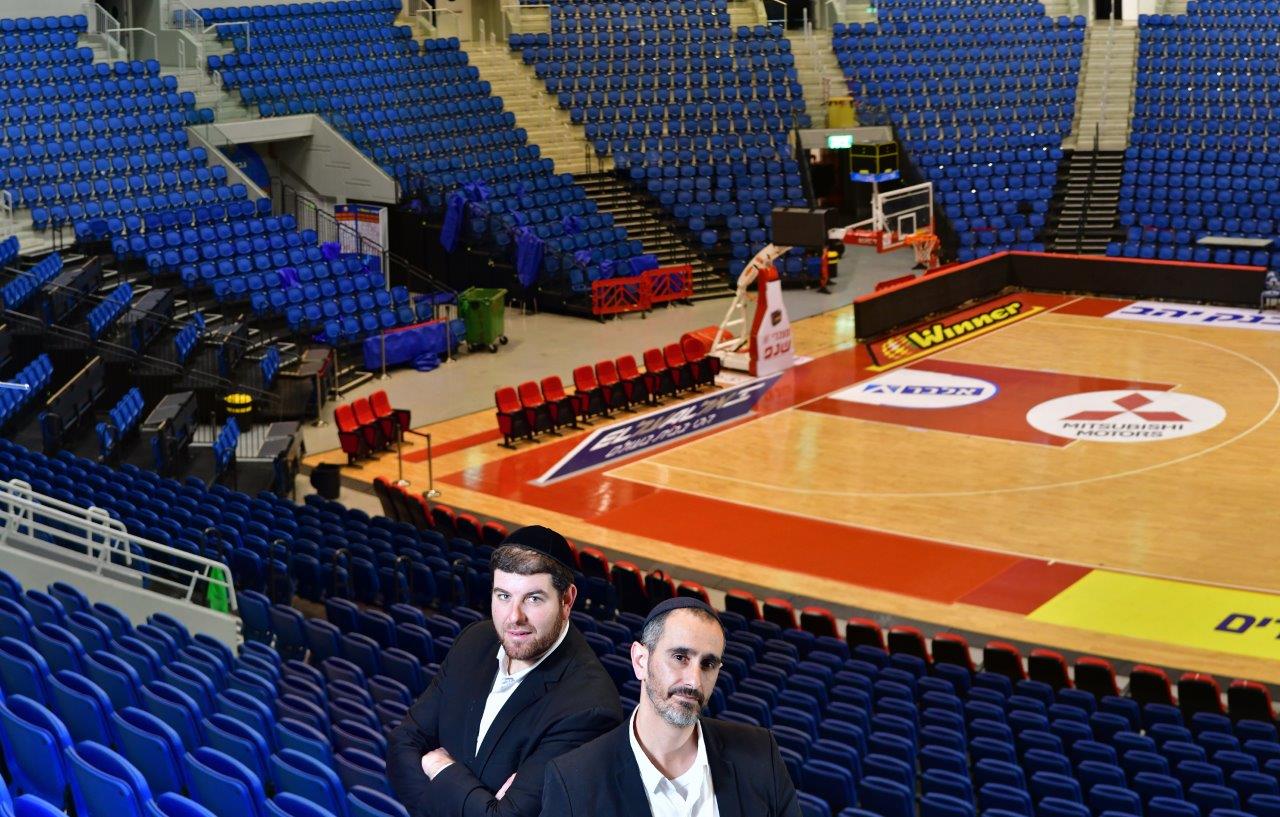Asaf Goren and Sharon Avilhak: "Three Months After Rabbi Zamir Cohen Appeared at Omman 17 – the Club Closed"
In an open conversation, the duo shares their journey to religious observance, an extraordinary Times Square performance, a touching call from Rabbi Yaakov Ades, and their upcoming Purim party, marking the only time in 18 years that Omman 17 closed on Shabbat.
 Photos: Rafi Kotz
Photos: Rafi KotzAt an age when average children celebrate bar mitzvahs and engage in studies and play with friends, Asaf Goren and Sharon Avilhak began organizing parties for teens older than them at the local community center in Ma'ale Adumim, near their hometown. A few years later, they would do so on some of the biggest stages the world has to offer.
From their first day in the field, like in any healthy partnership, the division of roles was clear and only benefited both sides. Sharon took up DJing, alongside composing, arranging, and performing. Meanwhile, Asaf commanded public relations and actual production. Of course, this was a broad division, and eventually, things mixed and blended, but within all this, they never forgot their main roles. Today, after a long and slow journey back to faith and a significant break from these fields, they have returned, and in their words – in a big way. We meet now for the upcoming Purim party they are producing, 'LeVasomei – a Mehudar Purim Party', which has received an esteemed 'certificate of approval' from prominent rabbis, including the Rishon LeZion, Rabbi Shlomo Moshe Amar.
Asaf Goren (39), currently residing in Har Homa, is married and a father of four, owning a branding, printing, and signage firm, and also as mentioned, involved in party and event production. "My office, which I manage today, essentially derived from my previous occupation. I have made invitations for clubs all my life, dealt with event productions, and did a lot of public relations, primarily in the nightlife industry. The club I worked with the most was Omman 17. I was practically part of the furniture there. Regarding the journey back to faith, it was on my mind for many years because Sharon returned to the path of faith, and I knew it very closely.

"However, the real change happened immediately after my father passed away. I was on my way to a Friday afternoon party I was producing, and on the way, I stopped by my parents' house. My father was ill, and his condition suddenly deteriorated that afternoon. On that Friday, he passed away. My father passed away literally in my arms, and this was very close to Shabbat. From day one of the shiva, many rabbis came, and one of them told me that saying Kaddish is the most important merit."
Nonetheless, Asaf didn't settle for just reciting the Kaddish and felt a need to take on additional commitments. "I asked the rabbi, 'What else should I do?' and he answered in detail and with patience. One of the things I immediately took upon myself was observing Shabbat. From the first Shabbat after my father passed, I started to observe. I think it’s connected to the feeling that in such moments the value of material things diminishes. One realizes how small and temporary he is. Then one sees the world in a healthier and more correct way. Though it happened very quickly and was quite technical, it grew from there. I went to prayers and lessons, and slowly, I learned and understood more and more things.
"I vividly remember those tough moments. Very quickly, feelings of strong spiritual connection burned within me. Connection to Hashem. As it happened, I went out to the garden and yelled and cried to the Holy One: ‘This is not the time, this is not the time, why did you take him?’ It was indeed a very hard experience for me. My father passed in the kitchen. For almost two years afterward, I couldn’t enter the kitchen in my parents' house. I simply wasn’t able. Additionally, I believe this is related as well; a child was born to us during that period, and it greatly affected me too.
"In any case, many people from the nightlife came to the shiva. My younger brother also worked at Omman 17. There was a huge party planned at the club on that Friday night when my father passed just a few hours before. The club owners heard about the passing and decided not to open it that night. I believe it was the only time in the history of the club it was closed on Shabbat. Only today do I understand what a merit he had, causing 2,000 people not to desecrate Shabbat. At first, I still used to go to clubs, continued working, and before and after, I went to synagogue. And gradually, it strengthened more and more. Whoever wants to enter the gates of holiness needs dedication, and that is something not always present right from the start. Today, thank Hashem, I am very far from those things."
The Day the Twins Fell
As for Sharon Avilhak (40), a father of six residing in the Jerusalem neighborhood of Mekor Chaim, working as a DJ, songwriter, composer, and music arranger, you probably already heard about him. Sharon is responsible for quite a few hits in the general and religious sectors and has played at hundreds of weddings so far. "My whole life I was involved in music," he adds. "I was a DJ from a very young age, and after the army, I wanted to DJ abroad, so I traveled, with Asaf of course, to try conquering the world. We flew to New York, where big things were happening in the field at the time, we stopped in London on the way to buy a few records, and soon set up base in Manhattan. After seven days in New York, we were already organizing a party".
According to Sharon, the success that smiled upon them – made him crave more. "After the first party, I continued DJing in various places, and the highlight of my time then was DJing with Tiesto, the number one DJ in the world at those days. It was a production for tens of thousands of people at the world’s most central location - Times Square. Shortly after, the Twin Towers fell in New York, and it was a total shock. I lived right next to them, and suddenly - no towers. There was great paranoia throughout the United States, and it was no longer the same. So I decided to return to Israel. At first, I worked at Omman 17, then I moved to Tel Aviv.
"During that period, I worked strongly on electronic music with Doron Elimelech, and we did very beautiful things. It reached where it reached, and we signed a contract for albums in the United States. I traveled there again. And it was precisely there, in the heart of New York, that my return to faith began. My older brother, who had returned to faith several years prior, put tefillin in my bag, and I suddenly felt a very big commitment to put them on. And also desire. I didn’t miss a day. Even when it was really hard. Several times, I left everything, half an hour to an hour before sunset, and traveled home by train just to put them on".
After some more time, Sharon says, his connection to Hashem strengthened, and he decided to return to Israel. "When I came back, I still continued to work, but soon I informed the Tel Aviv club I worked at that I was stopping working on Shabbat. They were in shock. They couldn’t believe it about me. During that period, we also produced songs for Maya Buskila and Mili Levi, and other artists, then my strengthening grew even more, and I stopped working with women. I lost a lot of money because of the decisions I made, but I wanted to be true to the truth".
Today, Sharon says, he has learned how to combine. How to use his talents for the benefit of sacred matters. Additionally, he sees it as a supreme value. "If once I wrote for Maya Buskila, in recent years I wrote for Meidad Tasa. For example, I composed 'On the Rivers of Babylon'. There have been years during which I separated from everything, and it wasn’t easy at all to do that. But then I learned that if a person received tools from Hashem, it’s because he received them to influence using them. We must repair the world and bring the redemption closer. And therefore, I think every person is even obligated to use the abilities Hashem gave him.
"True, I didn’t think or imagine I would engage in this anymore, because in my eyes it was connected to a non-kosher world, but today thank Hashem I am in a different place. At the beginning of my return to faith, I thought the world of Torah was only prayers, the graves of the righteous, tefillin, and such things. Then I began to receive signals from the heavens that I needed to return to engage in this. For example, the first song I composed was 'On the Rivers of Babylon', and it achieved every possible success in the religious world. Furthermore, one needs to know that today the world of Torah has an answer to everything. Those who want to listen to trance can do so in holiness. And so regarding all music genres. A person is exposed to things today, and there must be sacred answers to them within the Torah. Answers that are holy, according to Jewish law, and according to the guidance of our rabbis, the greats of Israel. 'Hidabroot' also uses all the most modern tools to increase sanctity. And this is obviously a blessed thing".
Rabbi Ades on the Line
Now, after we have had a deep acquaintance with the two, we can speak a little about the upcoming party they are organizing, the Purim party. In this part of the interview, it is almost impossible to separate their words, as they speak with great enthusiasm. It is clear that the matter truly burns in their hearts. "We are looking today at how to do what we know how to do best, but within holiness. According to the will of Hashem. And to connect to Him. And we did various things on this subject. For example, we brought Rabbi Zamir Cohen to Omman 17 a few years ago. It was something amazing. Incidentally, three months later the place suddenly closed. And that's after 18 years of continuous activity. These things have power".
According to Asaf and Sharon, the idea to produce 'LeVasomei', the upcoming Purim party, arose when they realized that there was a significant problem worth and important to provide a solution for. "Essentially what we want to offer here is a solution. There are tens of thousands of returnees who were used to celebrating Purim in a certain way. In clubs, at parties. And once a person returns to faith, there are many who are not sufficiently guided, or people who have many restrained desires, and they think - I can’t do this and that and this. And it’s not always true. There are laws and they cannot be deviated from, but some people unnecessarily impose strictness. And it can suppress the soul. And even distance a person from Hashem. And this is exactly what we are trying to stop".

However, their initial thought was different from how things eventually closed. "At first, we wanted it to be for men only. But then the rabbis we consulted said to us – and the women, will they stay home? What woman would want to stay home on Purim night, alone, when her husband goes out to celebrate? Then they told us to have an event for both men and women, with complete separation and separate entrances. Our rabbis are Avraham Crispin from Katamon and Rabbi Eyal Amrami from Har Homa, and they are well-acquainted with the world of returnees. However, it is interesting to know that although returnees are our basic audience, there is also significant interest from the secular public regarding this event. And if secular people will receive a spark of return to faith from this event, it is already worth everything to us. Many times people are afraid to return to faith because they think unfavorable things about the Torah world, and this can show them good things about Judaism.
"Another thing very important to us is that in terms of production level - everything will be extremely high. For instance, Eyal Golan is performing 24 hours before us in the same place, with the same LED screens, lighting, sound, etc. Everything will be very invested. In the religious world, things are sometimes done in a slapdash manner, but here it is completely different. Additionally, everyone who leaves the party will receive an elegant booklet of Purim laws, with the graphic line of the party. We thought of every detail. The Torah emphasis guides everything. This is the first and only goal. Because of this, the party won’t last till morning, so that people will get up for prayer and other mitzvot of the day. That is what guided us. Moreover, we made safety plans adapted for partitions, ushers for women, and many other good and important things. And of course, surprises."
Towards the end of our conversation, Sharon tells me that Rabbi Ades called him a few days ago. "It is impossible to reach Rabbi Ades; it is only he who reaches you. I believe it happens when he receives some sign from heaven. I know Rabbi Ades because I used to compose songs that were essentially his texts. He would recite them to me over the phone, and I would write exactly what he said, word for word. He would say, 'There are so and so letters; it corresponds to so and so names', and so on. Everything with him is Kabbalah. Anyway, he called and said he wanted to speak at the party, among other rabbis. To strengthen and say a few words of Torah, and mainly to make an acceptance of the yoke of the Kingdom of Heaven. We were very happy with his request. In the end, this is what we want – that as many people as possible take upon themselves the yoke of the Kingdom of Heaven with love and joy, just as truly happened in Purim, as it is written: 'The Jews established it and took it upon themselves in the days of Ahasuerus'. We pray to Hashem that indeed we succeed in this great and important mission, and that all our deeds be for the sake of Heaven."


